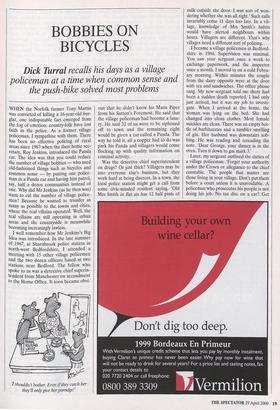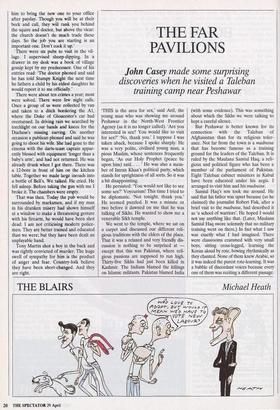BOBBIES ON BICYCLES
Dick Turral recalls his days as a village
policeman at a time when common sense and the push-bike solved most problems
WHEN the Norfolk farmer Tony Martin was convicted of killing a 16-year-old bur- glar, one indisputable fact emerged from the fog of emotion: country-folk have lost faith in the police. As a former village policeman, I sympathise with them. There has been no effective policing of rural areas since 1967 when the then home sec- retary, Roy Jenkins, introduced the Panda car. The idea was that you could reduce the number of village bobbies — who used old-fashioned things such as bicycles and common sense — by putting one police- man in a Panda car and having him patrol, say, half a dozen communities instead of one. Why did Mr Jenkins (as he then was) want to cut the number of village police- men? Because he wanted to transfer as many as possible to the towns and cities, Where the real villains operated. Well, the real villains are still operating in urban areas and the countryside is meanwhile becoming increasingly lawless. I well remember how Mr Jenkins's Big Idea was introduced. In the late summer of 1967, at Sharnbrook police station in north-west Bedfordshire, I attended a meeting with 15 other village policemen and the two dozen officers based at two stations near Bedford. The fellow who spoke to us was a detective chief superin- tendent from Manchester on secondment to the Home Office. It soon became obvi- 'I shouldn't bother. Even if they catch her they'll only give her porridge!' ous that he didn't know his Mans Piper from his Sutton's Foremost. He said that the village policeman had become a luxu- ry. He said 32 of us were to be siphoned off to town and the remaining eight would be given a car called a Panda. The way he told it, all a copper had to do was park his Panda and villagers would come flocking up with quality information on criminal activity. Was the detective chief superintendent on drugs? Or just thick? Villagers may be into everyone else's business, but they work hard at being discreet. In a town, the local police station might get a call from some civic-minded resident saying, 'Old Mrs Smith in flat six has 12 half pints of milk outside the door. I was sort of won- dering whether she was all right.' Such calls invariably come 11 days too late. In a vil- lage, knowledge of Mrs Smith's habits would have alerted neighbours within hours. Villagers are different. That's why villages need a different sort of policing.
I became a village policemen in Bedford- shire in 1964. Supervision was minimal. You saw your sergeant once a week to exchange paperwork, and the inspector once a month. I moved in on a cold Febru- ary morning. Within minutes the couple from the dairy opposite were at the door with tea and sandwiches. The office phone rang. My new sergeant told me there had been a sudden death reported. I had only just arrived, but it was my job to investi- gate. When I arrived at the home, the woman was lying on the bed. She had changed into clean clothes. Most female suicides are clean. There was an empty bot- tle of barbiturates and a tumbler smelling of gin. Her husband was downstairs sob- bing. He was reading and rereading the note. 'Dear George, your dinner is in the oven. Turn it down to gas mark 3.'
Later, my sergeant outlined the duties of a village policeman: 'Forget your authority under the Crown or allegiance to the chief constable. The people that matter are those living in your village. Don't put them before a court unless it is unavoidable. A policeman who prosecutes his people is not doing his job. No tax disc on a car? Get him to bring the new one to your office after payday. Though you will be at their beck and call, they will rank you behind the squire and doctor, but above the vicar: the church doesn't do much trade these days. So the job you are starting is an important one. Don't cock it up.'
There were six pubs to visit in the vil- lage. I supervised sheep-dipping. In a drawer in my desk was a book of village gossip kept by my predecessor. One of his entries read: 'The doctor phoned and said he has told Stumpy Knight the next time he fathers a child by his eldest daughter he would report it to me officially.'
There were about ten crimes a year; most were solved. There were few night calls. Once a group of us were collected by van and taken to a ditch bordering the Al, where the Duke of Gloucester's car had overturned. In driving rain we searched by torchlight on our hands and knees for the Duchess's missing earring. On another occasion a publican phoned and said he was going to shoot his wife. She had gone to the cinema with the darts-Learn captain appar- ently blessed with equipment 'longer than a baby's arm', and had not returned. He was already drunk when I got there. There was a 12-bore in front of him on the kitchen table. Together we made large inroads into a bottle of Bell's. We talked. He cried. He fell asleep. Before taking the gun with me I broke it. The chambers were empty.
That was then. Today the pub would be surrounded by marksmen, and if my man in his drunken misery had shown himself at a window to make a threatening gesture with his firearm, he would have been shot dead. I am not criticising modern police- men. They are better trained and educated than we were; but they have been dealt an unplayable hand.
Tony Martin shot a boy in the back and was rightly convicted of murder. The huge swell of sympathy for him is the product of anger and fear. Country-folk believe they have been short-changed. And they are right.



























































 Previous page
Previous page